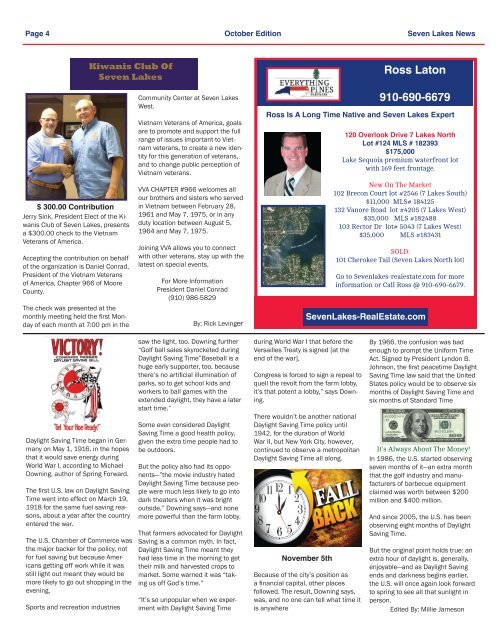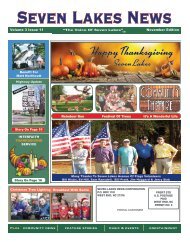SLN October
Create successful ePaper yourself
Turn your PDF publications into a flip-book with our unique Google optimized e-Paper software.
Page 4 <strong>October</strong> Edition Seven Lakes News<br />
Kiwanis Club Of<br />
Seven Lakes<br />
Ross Laton<br />
$ 300.00 Contribution<br />
Jerry Sink, President Elect of the Kiwanis<br />
Club of Seven Lakes, presents<br />
a $300.00 check to the Vietnam<br />
Veterans of America.<br />
Accepting the contribution on behalf<br />
of the organization is Daniel Conrad,<br />
President of the Vietnam Veterans<br />
of America, Chapter 966 of Moore<br />
County.<br />
The check was presented at the<br />
monthly meeting held the fi rst Monday<br />
of each month at 7:00 pm in the<br />
Community Center at Seven Lakes<br />
West.<br />
Vietnam Veterans of America, goals<br />
are to promote and support the full<br />
range of issues important to Vietnam<br />
veterans, to create a new identity<br />
for this generation of veterans,<br />
and to change public perception of<br />
Vietnam veterans.<br />
VVA CHAPTER #966 welcomes all<br />
our brothers and sisters who served<br />
in Vietnam between February 28,<br />
1961 and May 7, 1975, or in any<br />
duty location between August 5,<br />
1964 and May 7, 1975.<br />
Joining VVA allows you to connect<br />
with other veterans, stay up with the<br />
latest on special events.<br />
For More Information<br />
President Daniel Conrad<br />
(910) 986-5829<br />
By: Rick Levinger<br />
910-690-6679<br />
Ross Is A Long Time Native and Seven Lakes Expert<br />
120 Overlook Drive 7 Lakes North<br />
Lot #124 MLS # 182393<br />
$175,000<br />
Lake Sequoia premium waterfront lot<br />
with 169 feet frontage.<br />
New On The Market<br />
102 Brecon Court lot #2546 (7 Lakes South)<br />
$11,000 MLS# 184125<br />
132 Vanore Road lot #4205 (7 Lakes West)<br />
$35,000 MLS #182488<br />
103 Rector Dr lot# 5043 (7 Lakes West)<br />
$35,000 MLS #183431<br />
SOLD:<br />
101 Cherokee Tail (Seven Lakes North lot)<br />
Go to Sevenlakes-realestate.com for more<br />
information or Call Ross @ 910-690-6679.<br />
SevenLakes-RealEstate.com<br />
Daylight Saving Time began in Germany<br />
on May 1, 1916, in the hopes<br />
that it would save energy during<br />
World War I, according to Michael<br />
Downing, author of Spring Forward.<br />
The fi rst U.S. law on Daylight Saving<br />
Time went into effect on March 19,<br />
1918 for the same fuel saving reasons,<br />
about a year after the country<br />
entered the war.<br />
The U.S. Chamber of Commerce was<br />
the major backer for the policy, not<br />
for fuel saving but because Americans<br />
getting off work while it was<br />
still light out meant they would be<br />
more likely to go out shopping in the<br />
evening.<br />
Sports and recreation industries<br />
saw the light, too. Downing further<br />
“Golf ball sales skyrocketed during<br />
Daylight Saving Time”Baseball is a<br />
huge early supporter, too, because<br />
there’s no artifi cial illumination of<br />
parks, so to get school kids and<br />
workers to ball games with the<br />
extended daylight, they have a later<br />
start time.”<br />
Some even considered Daylight<br />
Saving Time a good health policy,<br />
given the extra time people had to<br />
be outdoors.<br />
But the policy also had its opponents—”the<br />
movie industry hated<br />
Daylight Saving Time because people<br />
were much less likely to go into<br />
dark theaters when it was bright<br />
outside,” Downing says—and none<br />
more powerful than the farm lobby.<br />
That farmers advocated for Daylight<br />
Saving is a common myth. In fact,<br />
Daylight Saving Time meant they<br />
had less time in the morning to get<br />
their milk and harvested crops to<br />
market. Some warned it was “taking<br />
us off God’s time.”<br />
“It’s so unpopular when we experiment<br />
with Daylight Saving Time<br />
during World War I that before the<br />
Versailles Treaty is signed [at the<br />
end of the war],<br />
Congress is forced to sign a repeal to<br />
quell the revolt from the farm lobby,<br />
it’s that potent a lobby,” says Downing.<br />
There wouldn’t be another national<br />
Daylight Saving Time policy until<br />
1942, for the duration of World<br />
War II, but New York City, however,<br />
continued to observe a metropolitan<br />
Daylight Saving Time all along.<br />
November 5th<br />
Because of the city’s position as<br />
a fi nancial capital, other places<br />
followed. The result, Downing says,<br />
was, and no one can tell what time it<br />
is anywhere<br />
By 1966, the confusion was bad<br />
enough to prompt the Uniform Time<br />
Act. Signed by President Lyndon B.<br />
Johnson, the fi rst peacetime Daylight<br />
Saving Time law said that the United<br />
States policy would be to observe six<br />
months of Daylight Saving Time and<br />
six months of Standard Time<br />
It’s Always About The Money!<br />
In 1986, the U.S. started observing<br />
seven months of it—an extra month<br />
that the golf industry and manufacturers<br />
of barbecue equipment<br />
claimed was worth between $200<br />
million and $400 million.<br />
And since 2005, the U.S. has been<br />
observing eight months of Daylight<br />
Saving Time.<br />
But the original point holds true: an<br />
extra hour of daylight is, generally,<br />
enjoyable—and as Daylight Saving<br />
ends and darkness begins earlier,<br />
the U.S. will once again look forward<br />
to spring to see all that sunlight in<br />
person.<br />
Edited By: Millie Jameson

















